|
|
|
Sort Order |
|
|
|
Items / Page
|
|
|
|
|
|
|
| Srl | Item |
| 1 |
ID:
179916
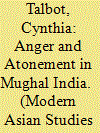

|
|
|
|
|
| Summary/Abstract |
Anger as an emotion is seldom attributed to Akbar (r. 1556–1605), the most admired of the Mughal emperors. Yet, on one notable day in 1578, he allegedly got so enraged that he almost lost his mind, according to Dalpat Vilas, an obscure chronicle composed in the vernacular. While the aftermath of Akbar's anger was reported in several Persian histories emanating from court circles, the royal rage itself was not. Why and how Dalpat Vilas ascribed anger, not only to the emperor but also to the local king, Raja Ray Singh of Bikaner, is the central issue addressed here. What little we know about the history of anger in precolonial India indicates it was an emotion that kings were advised to avoid, in both Sanskrit and Persian literature. But, from the more subaltern vantage point of Dalpat Vilas, written for a young Rajput warrior in a local dialect, rulers did act angrily and not always justly. This case illustrates the historiographic value of Indic-language texts sponsored by local subordinates of the Mughals, which can provide alternative perspectives on the empire. It also suggests the existence of multiple emotional communities in Mughal India, in which the significance of anger differed.
|
|
|
|
|
|
|
|
|
|
|
|
|
|
|
|
| 2 |
ID:
184160
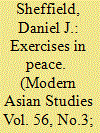

|
|
|
|
|
| Summary/Abstract |
In 1650, an encyclopedia of comparative religion known as Dabistān-i Maẕāhib (the School of Doctrines) was completed near the city of Hyderabad. Asserting that the religions of the world are reflections of a single inner truth, its author Mīrzā Ẕu'l-fiqār Āẕarsāsānī, known by the poetic penname ‘Mūbad’, travelled widely across India to record encounters with diverse religious figures. This article re-examines the composition and legacy of the Dabistān in light of new manuscript evidence relating to its author and the world he inhabited. It argues that the Dabistān's universalist project reflects a widely held theory of the interrelatedness of the macrocosm, in which sociality with diverse populations was understood to be a spiritual exercise leading to saintly perfection in the same way that venerating the cosmos and ascetic bodily practices were. The article provides a close reading of the Dabistān's shortest chapter on the religion of the Tibetans, the earliest such description in Persian. Situating the Dabistān within the diverse expressions of ‘Universal Peace’ (ṣulḥ-i kull) during the Safavid and Mughal periods, it argues that the Dabistān's project of recovering a universal theology that was attributed to ancient Iran and India led to expressions of dual religious belonging—to particular religions of revelation as well as to the universal religion of the philosophers—parallel to and connected with what Jan Assmann has termed the ‘religio duplex phenomenon’ in early modern Europe. Finally, the article briefly traces the legacy of the Dabistān into the modern period.
|
|
|
|
|
|
|
|
|
|
|
|
|
|
|
|
| 3 |
ID:
180034
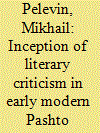

|
|
|
|
|
| Summary/Abstract |
The article overviews the earliest Pashto texts, mostly poetic, in which the incipient forms of literary criticism can be traced as authorial self-reflections related in Persian classics to the self-praise genre (fakhriyya) and explanations of reasons for composing works (sabab-i taʾlīf). Under close examination are the seventeenth century verses of the poets affiliated with the Roshānī religious community and the writings of Khushḥāl Khān Khaṫak (d. 1689). Analyzed texts prove that through the rudimentary discourse on a variety of literary criticism topics, Pashtun authors of early modern times declared and justified the presence of emerging literature in Pashto within the Persophone cultural space of Mughal India, articulating simultaneously their commitment to the proliferation of literacy and Islamic book culture among their countrymen.
|
|
|
|
|
|
|
|
|
|
|
|
|
|
|
|
| 4 |
ID:
089360
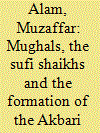

|
|
|
|
|
| Publication |
2009.
|
| Summary/Abstract |
This essay places Mughal-Sufi relationship within a larger sixteenth century context, focusing on the strategies the early Mughals adopted to build their power in India. It reviews the positions of the two important sufi groups, the Indian Chishtis and the Central Asian Naqshbandis, juxtaposing the political benefits or the loss that the Mughals saw in their associations with them. While the Naqshbandi worldview and the legacy of the legendary Ubaid Allah Ahrar clashed with their vision of power, in the Chishti ideology, on the other hand, they found a strong support for themselves. The Chishtis then had an edge at the time of Akbar. But the Naqshbandis under Khwaja Baqi Billah (d. 1603) continued in their endeavour to reinstate their place in Mughal India. The paper thus provides a backdrop and makes a plea for re-evaluating the debate on the ideology and politics of Shaikh Ahmad Sirhindi (d. 1624).
|
|
|
|
|
|
|
|
|
|
|
|
|
|
|
|
| 5 |
ID:
071693
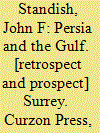

|
|
|
|
|
| Publication |
Surrey, Curzon Press, 1998.
|
| Description |
ix, 214p.pbk
|
| Standard Number |
0700702377
|
|
|
|
|
|
|
|
|
|
|
|
Copies: C:1/I:0,R:0,Q:0
Circulation
| Accession# | Call# | Current Location | Status | Policy | Location |
| 044099 | 955/STA 044099 | Main | On Shelf | General | |
|
|
|
|
| 6 |
ID:
048399
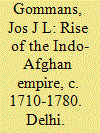

|
|
|
|
|
| Publication |
DelhI, Oxford University Press, 1999.
|
| Description |
xv, 219p.: maps, tablespbk
|
| Standard Number |
0195648056
|
|
|
|
|
|
|
|
|
|
|
|
Copies: C:1/I:0,R:0,Q:0
Circulation
| Accession# | Call# | Current Location | Status | Policy | Location |
| 041108 | 954.02/GOM 041108 | Main | On Shelf | General | |
|
|
|
|
| 7 |
ID:
111713
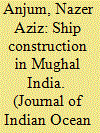

|
|
|
|
|
|
|
|